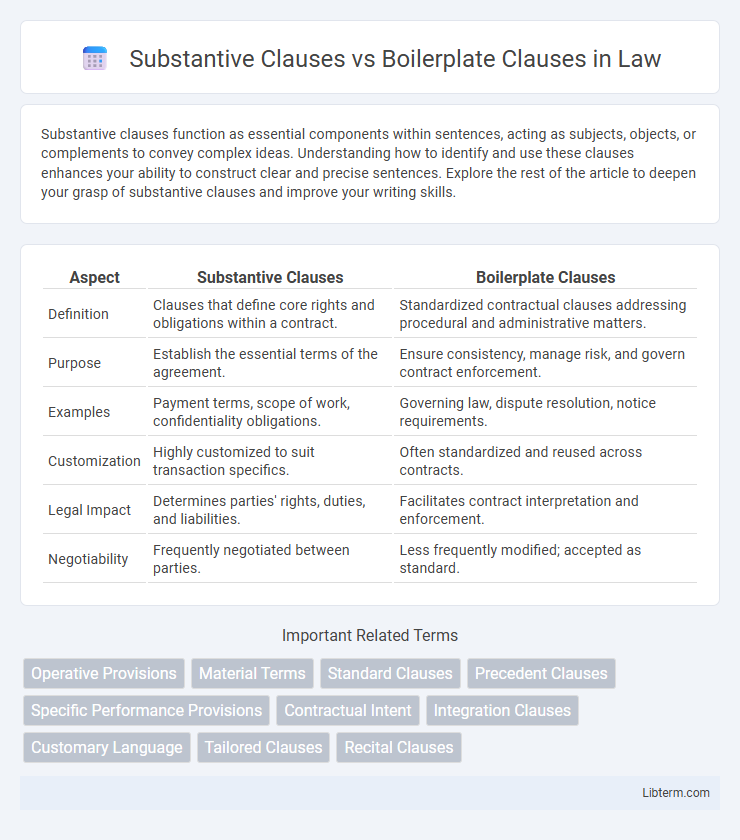Substantive clauses function as essential components within sentences, acting as subjects, objects, or complements to convey complex ideas. Understanding how to identify and use these clauses enhances your ability to construct clear and precise sentences. Explore the rest of the article to deepen your grasp of substantive clauses and improve your writing skills.
Table of Comparison
| Aspect | Substantive Clauses | Boilerplate Clauses |
|---|---|---|
| Definition | Clauses that define core rights and obligations within a contract. | Standardized contractual clauses addressing procedural and administrative matters. |
| Purpose | Establish the essential terms of the agreement. | Ensure consistency, manage risk, and govern contract enforcement. |
| Examples | Payment terms, scope of work, confidentiality obligations. | Governing law, dispute resolution, notice requirements. |
| Customization | Highly customized to suit transaction specifics. | Often standardized and reused across contracts. |
| Legal Impact | Determines parties' rights, duties, and liabilities. | Facilitates contract interpretation and enforcement. |
| Negotiability | Frequently negotiated between parties. | Less frequently modified; accepted as standard. |
Introduction to Substantive and Boilerplate Clauses
Substantive clauses define the core rights, duties, and obligations within a contract, shaping the essential agreement terms between parties. Boilerplate clauses consist of standardized provisions addressing procedural or administrative aspects like dispute resolution, governing law, and notice requirements, ensuring consistency across contracts. Understanding the distinction between substantive clauses and boilerplate clauses is crucial for effective contract drafting and interpretation.
Definition of Substantive Clauses
Substantive clauses serve as essential components within sentences, functioning as nouns that can act as subjects, objects, or complements to express complete ideas or propositions. These clauses provide specific information or content directly relevant to the main action or decision in legal or contractual contexts. Unlike boilerplate clauses, which consist of standardized, pre-written text addressing procedural or administrative matters, substantive clauses address the core rights, obligations, and terms agreed upon by the parties involved.
Definition of Boilerplate Clauses
Boilerplate clauses are standardized, pre-written provisions commonly included at the end of legal contracts to address general contractual issues such as jurisdiction, arbitration, force majeure, and entire agreement. These clauses serve to allocate risk, define procedural elements, and ensure consistency across various agreements, minimizing ambiguity and litigation risks. Unlike substantive clauses, which define the core rights and obligations of the parties, boilerplate clauses establish the legal framework supporting the contract's enforceability.
Key Differences Between Substantive and Boilerplate Clauses
Substantive clauses establish essential rights and obligations directly impacting the parties in a contract, often addressing core issues like payment terms, delivery, or performance standards. Boilerplate clauses consist of standardized provisions typically found at the end of contracts, focusing on procedural matters such as dispute resolution, governing law, and assignment rights. The key difference lies in their function: substantive clauses define the primary contractual duties, while boilerplate clauses govern the contract's administration and interpretation.
Importance of Substantive Clauses in Contracts
Substantive clauses in contracts define the core rights, obligations, and responsibilities of the parties involved, directly impacting the execution and enforcement of the agreement. These clauses establish critical terms such as payment schedules, delivery deadlines, and scope of work, ensuring clarity and reducing the risk of disputes. Precise and well-drafted substantive clauses enhance legal certainty and protect the interests of all parties by setting clear expectations and remedies.
Common Examples of Boilerplate Clauses
Common examples of boilerplate clauses in contracts include force majeure, governing law, dispute resolution, indemnity, severability, and entire agreement clauses. These standardized provisions are typically found at the end of contracts and serve to clarify procedural and legal frameworks without addressing the substantive rights and obligations between the parties. Unlike substantive clauses, which define the core duties and performance terms, boilerplate clauses provide consistency and risk management across various contractual agreements.
Legal Implications of Substantive Clauses
Substantive clauses in contracts define the core rights, duties, and obligations between parties, directly impacting the enforceability and interpretation of the agreement. These clauses carry significant legal weight as they shape the contractual relationship and can determine the outcome of disputes or litigation. In contrast, boilerplate clauses primarily address procedural aspects, such as jurisdiction and notice requirements, having less influence on the substantive legal obligations of the parties.
Risks of Overlooking Boilerplate Clauses
Overlooking boilerplate clauses in contracts can lead to significant legal risks including unintended waivers, jurisdiction disputes, and enforcement challenges. These standardized provisions govern key aspects such as dispute resolution, indemnity, and assignment rights, which if ignored, may compromise contract interpretation and execution. Failure to carefully review boilerplate clauses increases the likelihood of costly litigation and inconsistent application of contract terms.
Drafting Tips for Effective Clauses
Effective drafting of substantive clauses requires precise language that clearly defines the rights, duties, and obligations of the parties to avoid ambiguity and disputes. Boilerplate clauses should be customized rather than copied verbatim, ensuring consistency with the main contract's terms and jurisdictional requirements. Using clear, concise language and reviewing standard provisions in the context of the entire agreement enhances enforceability and reduces risk.
Conclusion: Balancing Substantive and Boilerplate Clauses
Balancing substantive and boilerplate clauses is essential for crafting effective contracts that address both specific obligations and general protections. Substantive clauses define core rights and duties, while boilerplate clauses ensure legal clarity and risk management through standard provisions like jurisdiction and force majeure. Integrating both types strategically enhances contract enforceability and reduces potential disputes.
Substantive Clauses Infographic

 libterm.com
libterm.com